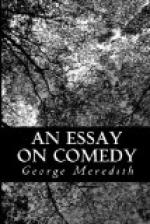The French have a school of stately comedy to which they can fly for renovation whenever they have fallen away from it; and their having such a school is mainly the reason why, as John Stuart Mill pointed out, they know men and women more accurately than we do. Moliere followed the Horatian precept, to observe the manners of his age and give his characters the colour befitting them at the time. He did not paint in raw realism. He seized his characters firmly for the central purpose of the play, stamped them in the idea, and by slightly raising and softening the object of study (as in the case of the ex-Huguenot, Duke de Montausier, {3} for the study of the Misanthrope, and, according to St. Simon, the Abbe Roquette for Tartuffe), generalized upon it so as to make it permanently human. Concede that it is natural for human creatures to live in society, and Alceste is an imperishable mark of one, though he is drawn in light outline, without any forcible human colouring. Our English school has not clearly imagined society; and of the mind hovering above congregated men and women, it has imagined nothing. The critics who praise it for its downrightness, and for bringing the situations home to us, as they admiringly say, cannot but disapprove of Moliere’s comedy, which appeals to the individual mind to perceive and participate in the social. We have splendid tragedies, we have the most beautiful of poetic plays, and we have literary comedies passingly pleasant to read, and occasionally to see acted. By literary comedies, I mean comedies of classic inspiration, drawn chiefly from Menander and the Greek New Comedy through Terence; or else comedies of the poet’s personal conception, that have had no model in life, and are humorous exaggerations, happy or otherwise. These are the comedies of Ben Jonson, Massinger, and Fletcher. Massinger’s Justice Greedy we can all of us refer to a type, ‘with fat capon lined’ that has been and will be; and he would be comic, as Panurge is comic, but only a Rabelais could set him moving with real animation. Probably Justice Greedy would be comic to the audience of a country booth and to some of our friends. If we have lost our youthful relish for the presentation of characters put together to fit a type, we find it hard to put together the mechanism of a civil smile at his enumeration of his dishes. Something of the same is to be said of Bobadil, swearing ‘by the foot of Pharaoh’; with a reservation, for he is made to move faster, and to act. The comic of Jonson is a scholar’s excogitation of the comic; that of Massinger a moralist’s.
Shakespeare is a well-spring of characters which are saturated with the comic spirit; with more of what we will call blood-life than is to be found anywhere out of Shakespeare; and they are of this world, but they are of the world enlarged to our embrace by imagination, and by great poetic imagination. They are, as it were—I put it to suit my present comparison—creatures of the woods and wilds, not in walled towns, not grouped and toned to pursue a comic exhibition of the narrower world of society. Jaques, Falstaff and his regiment, the varied troop of Clowns, Malvolio, Sir Hugh Evans and Fluellen—marvellous Welshmen!—Benedict and Beatrice, Dogberry, and the rest, are subjects of a special study in the poetically comic.




